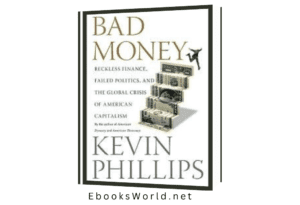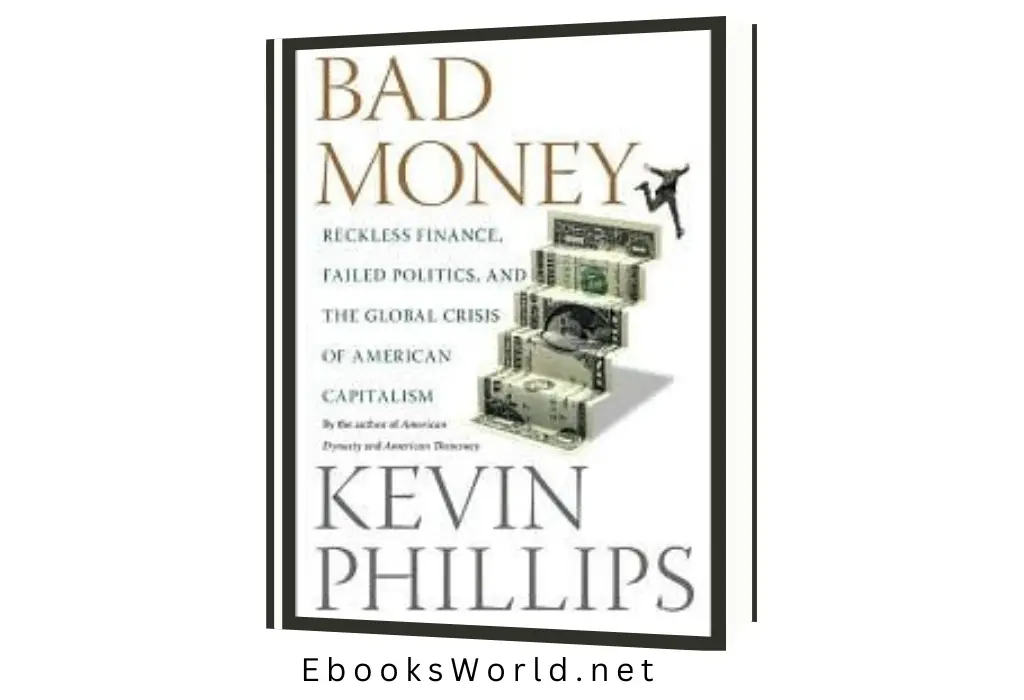Bad Money: Reckless Finance, Failed Politics, and the Global Crisis of American Capitalism

Ratings
“Bad Money: Reckless Finance, Failed Politics, and the Global Crisis of American Capitalism” is a critical examination of the financial and political landscape that led to the global economic crisis. Written by Kevin Phillips, a political and economic commentator, the book provides a comprehensive analysis of the factors that contributed to the crisis, focusing on the role of reckless financial practices and failed political policies in the context of American capitalism.
1. Introduction: Setting the Stage
Phillips begins by outlining the historical context of American capitalism, tracing its roots and evolution. He highlights the transition from productive capitalism to financial capitalism, where financial activities become more dominant than industrial production. This shift, he argues, laid the groundwork for the vulnerabilities that would later contribute to the global economic crisis.
2. The Rise of Financialization
One of the central themes of the book is the concept of financialization—the increasing influence of financial markets and institutions in shaping the economy. Phillips explores how the financial sector, once a supportive element of the economy, became a powerful force in its own right. He identifies the rise of complex financial instruments and the growth of speculative activities as key components of financialization.
3. Reckless Finance: The Housing Bubble and Subprime Crisis
Phillips delves into the housing bubble and the subprime mortgage crisis, two critical elements of the 2008 financial collapse. He explains how financial institutions engaged in risky lending practices, fueled by the belief that the housing market would continue to expand indefinitely. The author criticizes the lack of regulatory oversight that allowed these practices to flourish, ultimately leading to the catastrophic collapse of financial markets.
4. Failed Politics: The Role of Government Policies
The book explores the role of political decisions and policies in contributing to the economic crisis. Phillips argues that government policies, particularly those aimed at deregulation, played a significant role in creating an environment conducive to reckless financial behavior. He criticizes both Republican and Democratic administrations for their failure to address systemic issues and for succumbing to the influence of powerful financial interests.
5. The Political Economy of Oil
Phillips also delves into the geopolitical and economic implications of oil, examining how America’s dependence on foreign oil influenced its economic and foreign policy decisions. He argues that the intertwining of oil interests with the broader economy had profound consequences, including contributing to the rising national debt and affecting the nation’s global standing.
6. Globalization and Its Discontents
The book discusses the impact of globalization on the American economy. While acknowledging the benefits of increased global trade, Phillips critiques the negative consequences, such as the outsourcing of jobs and the erosion of the manufacturing sector. He argues that the pursuit of globalization without adequate safeguards contributed to economic imbalances and discontent among the American working class.
7. The Crisis Unfolds: From Wall Street to Main Street
As the financial crisis unfolds, Phillips analyzes its ripple effects from Wall Street to Main Street. He discusses the government’s response to the crisis, including the controversial bailouts of major financial institutions. Phillips contends that these measures, while preventing a complete collapse, failed to address the root causes of the crisis and instead perpetuated a system prone to further abuses.
8. The Global Dimension: Impact on the World Economy
Examining the global ramifications, Phillips explores how the American economic crisis reverberated internationally. He discusses the interconnectedness of global financial markets and how the crisis exposed vulnerabilities in the international economic system. The author suggests that the American crisis served as a catalyst for broader discussions about the reform of international financial institutions.
9. Lessons Learned and Unlearned
In the concluding chapters, Phillips reflects on the lessons that should be learned from the crisis. He emphasizes the need for structural reforms in both the financial and political realms to prevent a recurrence of similar disasters. Phillips advocates for a reevaluation of economic policies and a return to a more balanced and sustainable form of capitalism.
10. Critique and Controversies
The book has been both praised and criticized. Supporters appreciate its in-depth analysis and critique of financial and political systems, while critics argue that Phillips may oversimplify complex issues and overstate the role of American capitalism in the global economic crisis.
In summary, “Bad Money” is a thought-provoking examination of the interplay between reckless finance, failed politics, and the global crisis of American capitalism. Through a historical lens, Phillips sheds light on the factors that led to the 2008 financial collapse and advocates for systemic reforms to create a more stable and equitable economic system.







